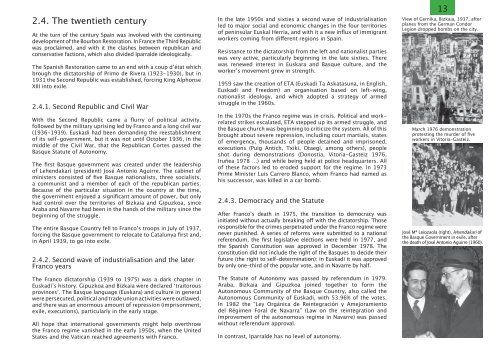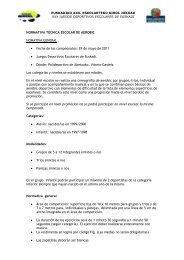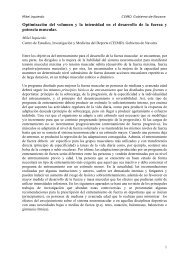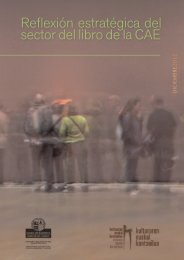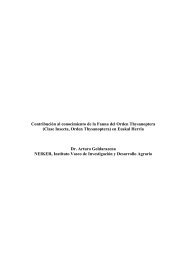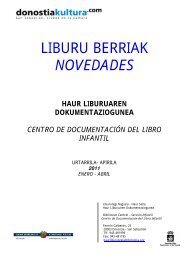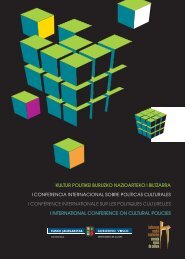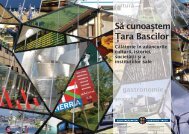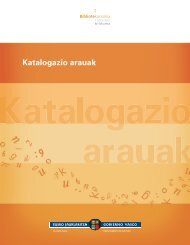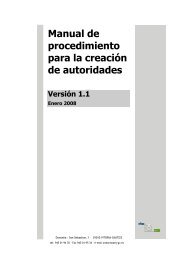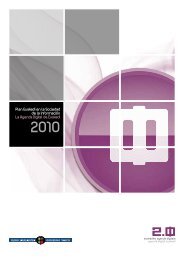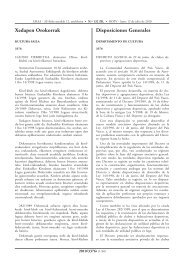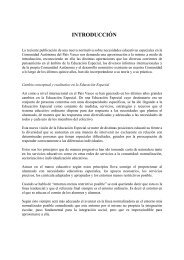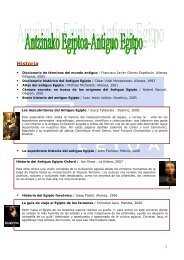The Basque Country (pdf, 4,3Mb) - Kultura Saila - Euskadi.net
The Basque Country (pdf, 4,3Mb) - Kultura Saila - Euskadi.net
The Basque Country (pdf, 4,3Mb) - Kultura Saila - Euskadi.net
Create successful ePaper yourself
Turn your PDF publications into a flip-book with our unique Google optimized e-Paper software.
2.4. <strong>The</strong> twentieth century<br />
At the turn of the century Spain was involved with the continuing<br />
development of the Bourbon Restoration. In France the Third Republic<br />
was proclaimed, and with it the clashes between republican and<br />
conservative factions, which also divided Iparralde ideologically.<br />
<strong>The</strong> Spanish Restoration came to an end with a coup dʼétat which<br />
brough the dictatorship of Primo de Rivera (1923-1930), but in<br />
1931 the Second Republic was established, forcing King Alphonse<br />
XIII into exile.<br />
2.4.1. Second Republic and Civil War<br />
With the Second Republic came a flurry of political activity,<br />
followed by the military uprising led by Franco and a long civil war<br />
(1936-1939). <strong>Euskadi</strong> had been demanding the reestablishment<br />
of its self-government, but it was not until October 1936, in the<br />
middle of the Civil War, that the Republican Cortes passed the<br />
<strong>Basque</strong> Statute of Autonomy.<br />
<strong>The</strong> first <strong>Basque</strong> government was created under the leadership<br />
of Lehendakari (president) José Antonio Aguirre. <strong>The</strong> cabi<strong>net</strong> of<br />
ministers consisted of five <strong>Basque</strong> nationalists, three socialists,<br />
a communist and a member of each of the republican parties.<br />
Because of the particular situation in the country at the time,<br />
the government enjoyed a significant amount of power, but only<br />
had control over the territories of Bizkaia and Gipuzkoa, since<br />
Araba and Navarre had been in the hands of the military since the<br />
beginning of the struggle.<br />
<strong>The</strong> entire <strong>Basque</strong> <strong>Country</strong> fell to Francoʼs troops in July of 1937,<br />
forcing the <strong>Basque</strong> government to relocate to Catalunya first and,<br />
in April 1939, to go into exile.<br />
2.4.2. Second wave of industrialisation and the later<br />
Franco years<br />
<strong>The</strong> Franco dictatorship (1939 to 1975) was a dark chapter in<br />
<strong>Euskadi</strong>ʼs history. Gipuzkoa and Bizkaia were declared ʻtraitorous<br />
provincesʼ. <strong>The</strong> <strong>Basque</strong> language (Euskara) and culture in general<br />
were persecuted, political and trade union activities were outlawed,<br />
and there was an enormous amount of repression (imprisonment,<br />
exile, executions), particularly in the early stage.<br />
All hope that international governments might help overthrow<br />
the Franco regime vanished in the early 1950s, when the United<br />
States and the Vatican reached agreements with Franco.<br />
In the late 1950s and sixties a second wave of industrialisation<br />
led to major social and economic changes in the four territories<br />
of peninsular Euskal Herria, and with it a new influx of immigrant<br />
workers coming from different regions in Spain.<br />
Resistance to the dictatorship from the left and nationalist parties<br />
was very active, particularly beginning in the late sixties. <strong>The</strong>re<br />
was renewed interest in Euskara and <strong>Basque</strong> culture, and the<br />
workerʼs movement grew in strength.<br />
1959 saw the creation of ETA (<strong>Euskadi</strong> Ta Askatasuna, in English,<br />
<strong>Euskadi</strong> and Freedom) an organisation based on left-wing,<br />
nationalist ideology, and which adopted a strategy of armed<br />
struggle in the 1960s.<br />
In the 1970s the Franco regime was in crisis. Political and workrelated<br />
strikes escalated, ETA stepped up its armed struggle, and<br />
the <strong>Basque</strong> church was beginning to criticize the system. All of this<br />
brought about severe repression, including court martials, states<br />
of emergency, thousands of people detained and imprisoned,<br />
executions (Puig Antich, Txiki, Otaegi, among others), people<br />
shot during demonstrations (Donostia, Vitoria-Gasteiz 1976,<br />
Iruñea 1978 …) and while being held at police headquarters. All<br />
of these factors led to eroded support for the regime. In 1973<br />
Prime Minister Luis Carrero Blanco, whom Franco had named as<br />
his successor, was killed in a car bomb.<br />
2.4.3. Democracy and the Statute<br />
After Francoʼs death in 1975, the transition to democracy was<br />
initiated without actually breaking off with the dictatorship. Those<br />
responsible for the crimes perpetrated under the Franco regime were<br />
never punished. A series of reforms were submitted to a national<br />
referendum, the first legislative elections were held in 1977, and<br />
the Spanish Constitution was approved in December 1978. <strong>The</strong><br />
constitution did not include the right of the <strong>Basque</strong>s to decide their<br />
future (the right to self-determination); in <strong>Euskadi</strong> it was approved<br />
by only one-third of the popular vote, and in Navarre by half.<br />
<strong>The</strong> Statute of Autonomy was passed by referendum in 1979.<br />
Araba, Bizkaia and Gipuzkoa joined together to form the<br />
Autonomous Community of the <strong>Basque</strong> <strong>Country</strong>, also called the<br />
Autonomous Community of <strong>Euskadi</strong>, with 53.96% of the votes.<br />
In 1982 the “Ley Orgánica de Reintegración y Amejoramiento<br />
del Régimen Foral de Navarra” (Law on the reintegration and<br />
improvement of the autonomous regime in Navarre) was passed<br />
without referendum approval.<br />
In contrast, Iparralde has no level of autonomy.<br />
13<br />
View of Gernika, Bizkaia, 1937, after<br />
planes from the German Condor<br />
Legion dropped bombs on the city.<br />
March 1976 demonstration<br />
protesting the murder of five<br />
workers in Vitoria-Gasteiz.<br />
José Mª Leiozaola (right), lehendakari of<br />
the <strong>Basque</strong> Government in exile, after<br />
the death of José Antonio Aguirre (1960).


